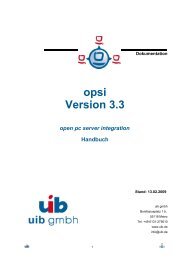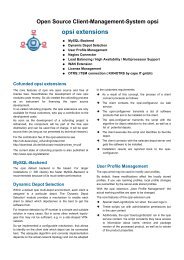opsi Version 3.3.1 - opsi Download - uib
opsi Version 3.3.1 - opsi Download - uib
opsi Version 3.3.1 - opsi Download - uib
You also want an ePaper? Increase the reach of your titles
YUMPU automatically turns print PDFs into web optimized ePapers that Google loves.
3.5.1. Overview<br />
3. <strong>opsi</strong> configuration and tools<br />
<strong>opsi</strong> V3 introduced an <strong>opsi</strong> owned python library which provides an API for <strong>opsi</strong><br />
configuration. The '<strong>opsi</strong>confd' provides this API as a web service, whereas '<strong>opsi</strong>-admin'<br />
is the command line interface for this API.<br />
'<strong>opsi</strong>-admin' provides an interactive mode and a non interactive mode for batch<br />
processing from within scripts.<br />
The help option <strong>opsi</strong>-admin -h shows a list of available command line options:<br />
# <strong>opsi</strong>-admin -h<br />
Usage: <strong>opsi</strong>-admin [-u -p -a -d -l -f -i -c -s] [command] [args...]<br />
-h, --help Display this text<br />
-u, --username Username (default: current user)<br />
-p, --password Password (default: prompt for password)<br />
-a, --address URL of <strong>opsi</strong>confd (default: https://localhost:4447/rpc)<br />
-d, --direct Do not use <strong>opsi</strong>confd<br />
-l, --loglevel Set log level (default: 2)<br />
0=nothing, 1=critical, 2=error, 3=warning, 4=notice,<br />
5=info, 6=debug<br />
-f, --log-file Path to log file<br />
-i, --interactive Start in interactive mode<br />
-c, --colorize Colorize output<br />
-S, --simple-output Simple output (only for scalars, lists)<br />
-s, --shell-output Shell output<br />
'<strong>opsi</strong>-admin' can use the <strong>opsi</strong> web service or directly operate on the data backend. To<br />
work with the web service you have to provide the URL and also an user name and<br />
password. Due to security reasons you probably wouldn't like to do this from within a<br />
script. In that case you'd prefer direct access to the data base using the -d option:<br />
<strong>opsi</strong>-admin -d.<br />
In interactive mode (start with <strong>opsi</strong>-admin -i or <strong>opsi</strong>-admin -d -i -c) you get input<br />
support with the TAB-key. After some input, with the TAB-button you get a list or details<br />
of the data type of the next expected input.<br />
The option -s or -S generates an output format which can be easily parsed by scripts.<br />
There are some methods which are directly based on API-requests, and there are some<br />
'tasks', which are a collection of function calls to do a more complex special job.<br />
27








